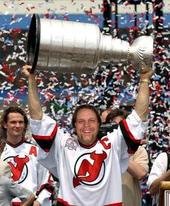I may have been 12, but I was very aware of what was going on in the world at the age of 12. Thankfully.
The year was 1980. America didn't hate itself - it was too depressed to hate itself. High unemployment rates. Huge deficits. Energy issues. Post-Watergate. Post-Vietnam. Our confidence was so low as a country on so many fronts, our own president called, "...a crisis of confidence..." There were 52 hostages in Iran that we couldn't free from their captures, and it seemed like the Soviet Union was getting stronger, and stronger, and stronger. On a scale of 1-10 (1 low and 10 high), feeling good about being an American in early February of 1980 rated around a 2.
And then those 20 college kids came along. And everything changed.
For those (like the majority of people I work with) who weren't even born yet, let me explain further. In 1980, our olympic teams were formed solely of actual amateur athletes, within International Olympic Committee rules and guidelines. However, most of the other countries, specifically the Soviet Union, used professional players. The Soviet team in hockey was favored to win in 1980, and not just because it had won the gold medal the four previous times they held the games. Prior to the start of the hockey season in October, the Soviets played a team of NHL All-Stars, the best players in the world. The Soviets easily won 6-0. And just prior to the start of the games themselves, the Soviet team played an exhibition game against the United States team, and the Soviets easily won 10-3.
The United States team wasn't supposed to even contend for a medal. But there they were, 28 years ago today on Friday February 22, 1980, preparing to meet the mighty Red Army team in the medal round.
What I remember looking back on it now, 28 years to the day, is some of things I didn't pick up on as a 12-year old that day. Consider that the IOC refused to change the start time of the game from 5PM ET to 8PM ET to accommodate ABC. This meant that the game was broadcast on tape-delay on ABC, but appeared to be live for those watching. That's because there was no internet to get updated scores. There were no cell phones for word to get out from the arena that this incredible upset had just happened. ESPN had just launched 4 months earlier.
Yet every time I watch the game now, the saves that Jim Craig made in goal are even more incredible. And I'm amazed watching Mike Eurizione shoot off the wrong foot and score the game-winning goal. And every time I watch the final minute, and here Al Michaels make what I think is the greatest call in sports history, and the final seconds tick away, tears present themselves on my face.
That was the first time in my life that I believed in miracles.
It gets harder and harder to believe in them now. In many ways, life in this country today, from a confidence and patriotism standpoint, rival the way things were in 1980. Maybe they are that's bad, but they're in the neighborhood. I wonder if I'll ever again see something like that ever again. And maybe that's why this day means so much to me, as someone who went through it in 1980.
We have holidays for all kinds of reasons - some good, some suspect. Isn't it time we celebrate the anniversary of this monumental event in our country's history? Isn't it time we acknowledge that it is the single biggest day of positive feelings and unity this country has felt in the last 50 years?
This much I know: ESPN is doing this stupid 'Greatest Sports Highlight Ever' thing on SportsCenter right now, and if the Miracle on Ice doesn't win, then ESPN should be shut down immediately.
I may have been 12 back then, but the memory is still so fresh, and still so very much alive in me. To the members of that team: thank you.
Subscribe to:
Post Comments (Atom)


No comments:
Post a Comment